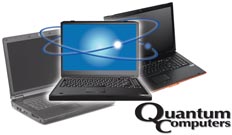Fast quantum computers come a step closer to reality
 Washington, August 21 : A team of researchers in the U. S. has come up with the fastest quantum computer bit, which exploits the main advantage of the qubit over the conventional bit.
Washington, August 21 : A team of researchers in the U. S. has come up with the fastest quantum computer bit, which exploits the main advantage of the qubit over the conventional bit.
The team—comprising experts from the University of Michigan, U. S. Naval Research Laboratory, and the University of California at San Diego—has revealed that the use of lasers helped create an initialised quantum state of the solid-state qubit at rates of about a gigahertz, or a billion times per second.
The researchers believe that they can use lasers to achieve fundamental steps towards programming it.
The scientists used lasers to create an initialised quantum state of this solid-state qubit at rates of about a gigahertz, or a billion times per second. They can also use lasers to achieve fundamental steps toward programming it.
Physics professor Duncan Steel, doctoral student Xiaodong Xu, and their colleagues used lasers to stably trap the spin of one electron confined in a single semiconductor quantum dot, which is like a transistor in a conventional computer.
The researchers say that they trapped the spin in a dark state wherein they could arbitrarily adjust the amount of 0 and 1 the qubit represents.
They termed this state "dark" because it does not absorb light, and thus light does not cause loss of coherence between the two states.
"We are the first to show that you can do this to a single electron in a self-assembled quantum dot. If you''re going to do quantum computing, you have to be able to work with one electron at a time," Nature magazine quoted Steel as saying.
The researcher revealed that his approach was to use ultrafast lasers to manipulate arrays of semiconductor quantum dots, each containing one electron.
Using two laser frequencies, Steel and colleagues have trapped an electron as a 0 and a 1 at the same time, and they can adjust the amount of each.
Since the electron is trapped in a dark state, according to the researchers, applied light cannot destroy the coherence.
Energy from light can flip the spin of electrons, or quantum bits, which would jumble any information being stored in the bit.
"This dark state is a place where information can be stored without any error," Steel said.
The researchers are of the view that the ability of quantum computers to represent multiple states simultaneously could theoretically enable them to factor numbers dramatically faster.
They say that this approach can vastly improve computer security, as it may pave the way for smaller computers than conventional computers.
"The National Security Agency has said that based on our present technology, we have about a 20-year window of security. That means if we sent up a satellite today, it would take somebody about 20 years to crack the code. Quantum computers will let you develop a code that would be impossible to crack with a conventional computer," Steel said. (ANI)